2016江苏省英语听力口语考试纲要第二部分
- 格式:doc
- 大小:70.00 KB
- 文档页数:21
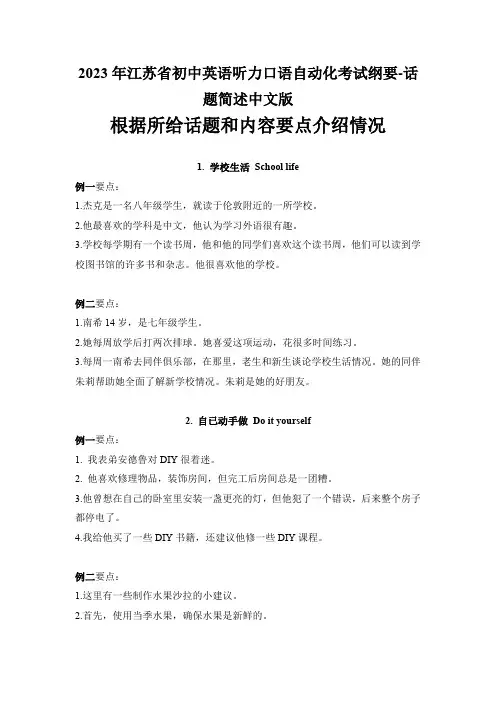
2023年江苏省初中英语听力口语自动化考试纲要-话题简述中文版根据所给话题和内容要点介绍情况1. 学校生活School life例一要点:1.杰克是一名八年级学生,就读于伦敦附近的一所学校。
2.他最喜欢的学科是中文,他认为学习外语很有趣。
3.学校每学期有一个读书周,他和他的同学们喜欢这个读书周,他们可以读到学校图书馆的许多书和杂志。
他很喜欢他的学校。
例二要点:1.南希14岁,是七年级学生。
2.她每周放学后打两次排球。
她喜爱这项运动,花很多时间练习。
3.每周一南希去同伴俱乐部,在那里,老生和新生谈论学校生活情况。
她的同伴朱莉帮助她全面了解新学校情况。
朱莉是她的好朋友。
2. 自已动手做Do it yourself例一要点:1. 我表弟安德鲁对DIY很着迷。
2. 他喜欢修理物品,装饰房间,但完工后房间总是一团糟。
3.他曾想在自己的卧室里安装一盏更亮的灯,但他犯了一个错误,后来整个房子都停电了。
4.我给他买了一些DIY书籍,还建议他修一些DIY课程。
例二要点:1.这里有一些制作水果沙拉的小建议。
2.首先,使用当季水果,确保水果是新鲜的。
3.其次,搭配不同颜色的水果,比如,把红苹果、青梨和紫葡萄搭配起来会使沙拉看上去五彩缤纷。
4.最后,在打算食用前再准备水果沙拉,有些水果在空气中放置一段时间后会很快变成褐色。
3. 自然灾害Natural disasters例一要点:1.今天我想给大家一些防范自然灾害或意外事故的建议。
2.如果楼房着火了,你不要躲起来,要尽可能快地跑出去。
用湿毛巾捂住口鼻以防浓烟。
3.地震发生时,你应该躲在坚固的桌子下,保护自己。
不要站在窗户附近,否则你可能会受伤。
4.我希望这些建议能对你们有帮助。
例二要点:1.洪涝已经成为许多国家的一个主要问题。
2.洪水会造成严重的问题:田地和房屋被冲走,饮用水被污染。
而且,许多人无家可归。
3.有些地区经常发生洪水的原因有很多。
夏天通常有大暴雨。
大片的森林逐渐被砍伐。
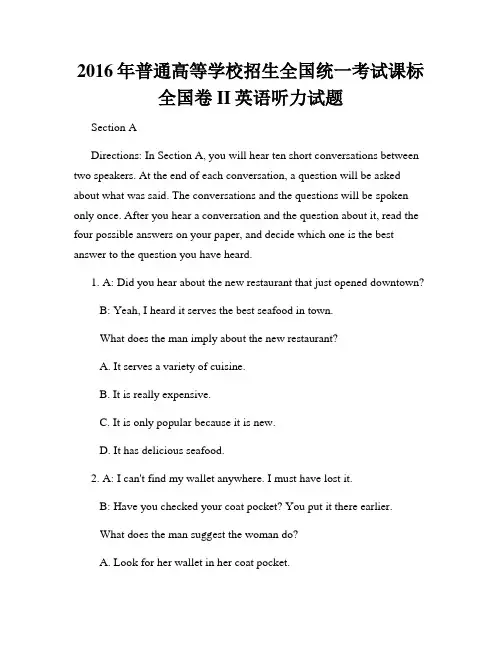
2016年普通高等学校招生全国统一考试课标全国卷II英语听力试题Section ADirections: In Section A, you will hear ten short conversations between two speakers. At the end of each conversation, a question will be asked about what was said. The conversations and the questions will be spoken only once. After you hear a conversation and the question about it, read the four possible answers on your paper, and decide which one is the best answer to the question you have heard.1. A: Did you hear about the new restaurant that just opened downtown?B: Yeah, I heard it serves the best seafood in town.What does the man imply about the new restaurant?A. It serves a variety of cuisine.B. It is really expensive.C. It is only popular because it is new.D. It has delicious seafood.2. A: I can't find my wallet anywhere. I must have lost it.B: Have you checked your coat pocket? You put it there earlier.What does the man suggest the woman do?A. Look for her wallet in her coat pocket.B. Check her other pockets.C. Retrace her steps.D. Go to the Lost and Found.3. A: Are you interested in buying a new car?B: I would love to, but I can't afford it at the moment.What does the man mean?A. He doesn't plan to buy a car.B. He has enough money to buy a car.C. He wants to buy a car in the future.D. He doesn't have enough money to buy a car now.4. A: Do you mind if I turn on the air-conditioner?B: Not at all. It's getting too warm in here.What does the woman imply?A. The air-conditioner is not working properly.B. The weather is cool enough without the air-conditioner.C. The air-conditioner should be turned on.D. The room is too cold with the air-conditioner on.5. A: Why don't we meet at the café around the corner?B: Sounds good. I'll see you there.Where will the two speakers meet?A. At the train station.B. At the park.C. At the café.D. At the man's house.6. A: I'm thinking about buying a new computer. Any recommendations?B: You should definitely go for the latest model. It has all the newest features.What does the woman advise the man to do?A. Not buy a new computer.B. Choose the latest model.C. Buy a computer with older features.D. Wait for a better model to be released.7. A: Excuse me, is this seat taken?B: I'm sorry, my friend just left to get us some drinks. He'll be back soon.What does the woman mean?A. The man should wait for his friend to come back.B. The seat is available, but temporarily occupied.C. The seat is reserved for someone else.D. The man can sit in the seat.8. A: Did you see the new exhibition at the art gallery?B: No, I haven't had a chance to go yet. Is it any good?What does the man imply?A. He has seen the exhibition and enjoyed it.B. He has seen the exhibition and didn't like it.C. He plans to go to the exhibition later.D. He hasn't been to the exhibition.9. A: What do you think of the speech our professor gave today? B: It was quite informative, but a bit lengthy.What does the woman imply about the speech?A. It was too short.B. It was boring.C. It was too long.D. It was interesting.10. A: I can't find the book I borrowed from the library anywhere. B: Was it due back today? If not, you can renew it online.What does the woman suggest the man do?A. Renew his library book.B. Look for his book elsewhere.C. Return the book to the library.D. Pay a fine for not returning the book on time.Section BDirections: In Section B, you will hear two short passages, and you will be asked three questions on each of the passages. The passages will be read twice, but the questions will be spoken only once. When you hear a question, read the four possible answers on your paper and decide which one is the best answer to the question you have heard.Passage OneChinese culture has a long history, and one of the most celebrated forms of art is Chinese calligraphy. Calligraphy, which literally means "beautiful writing," is a form of visual art that combines writing and painting. It is considered a high form of art that requires great skill and training. Chinese characters are formed using a brush dipped in ink and are a combination of vertical, horizontal, and diagonal strokes. The style of calligraphy can vary greatly, depending on the calligrapher's personal style, mood, and the historical period in which it was created. Calligraphy is highly regarded by the Chinese people and has become a symbol of cultural identity.11. What is Chinese calligraphy?A. A combination of vertical, horizontal, and diagonal strokes.B. A famous Chinese painting.C. A form of writing and painting.D. A symbol of Chinese cultural identity.12. What does calligraphy require?A. A high level of artistic skill.B. Years of training.C. Great patience.D. All of the above.13. What does the passage say about the style of calligraphy?A. It never changes.B. It varies depending on the calligrapher's mood.C. It is the same for all calligraphers.D. It only depends on the historical period.Passage TwoWaste management is an important issue worldwide. One solution to reduce waste is recycling. Recycling involves the collection and processing of waste materials such as paper, plastic, and glass, and turning them into new products. Recycling helps to conserve natural resources and reduces pollution caused by waste disposal. Many countries have implemented recycling programs to encourage citizens to recycle and provide the necessary infrastructure for the collection and processing of recyclable materials. However, there are still challenges to overcome, such as raising public awareness and ensuring proper separation of recyclable materials from general waste.14. What is one solution to reduce waste?A. Waste disposal.B. Recycling.C. Natural resource conservation.D. Pollution reduction.15. What is the purpose of recycling programs?A. To create new products.B. To process waste materials.C. To raise public awareness.D. To provide infrastructure.16. What are some challenges in recycling?A. Raising public awareness.B. Ensuring proper separation of recyclable materials.C. Collecting and processing waste materials.D. All of the above.Section CDirections: In Section C, you will hear two longer conversations. The conversations will be read twice, but the questions will be spoken only once. After you hear a question, read the four possible answers on your paper, and decide which one is the best answer to the question you have heard.Conversation OneW: I can't believe how crowded the shopping mall is today. I can hardly move.M: Yeah, it's always like this on weekends. I prefer going during the week when it's less crowded.17. What do the speakers say about the shopping mall today?A. It's always crowded on weekends.B. It's less crowded during the week.C. It's never crowded.D. It's crowded every day.Conversation TwoM: Are you going to the party next Friday?W: I don't think so. I have a lot of work to do, and I need to study for an exam.M: That's too bad. It won't be the same without you.18. Why isn't the woman going to the party?A. She has to go to work.B. She has to study for an exam.C. She has other plans.D. She doesn't like parties.19. How does the man feel about the woman not going to the party?A. He is disappointed.B. He is happy.C. He doesn't care.D. He is relieved.This is the end of the listening section.。
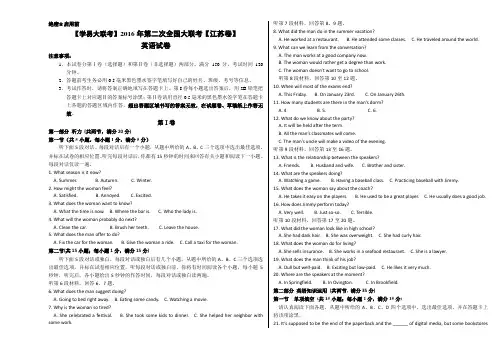
绝密★启用前【学易大联考】2016年第二次全国大联考【江苏卷】英语试卷注意事项:1.本试卷分第Ⅰ卷(选择题)和第Ⅱ卷(非选择题)两部分。
满分150分,考试时间120分钟。
2.答题前考生务必用0.5毫米黑色墨水签字笔填写好自己的姓名、班级、考号等信息。
3.考试作答时,请将答案正确地填写在答题卡上。
第I卷每小题选出答案后,用2B铅笔把答题卡上对应题目的答案标号涂黑;第Ⅱ卷请用直径0.5毫米的黑色墨水签字笔在答题卡上各题的答题区域内作答,超出答题区域书写的答案无效,在试题卷、草稿纸上作答无..........................效.。
第Ⅰ卷第一部分听力(共两节,满分20分)第一节(共5小题,每小题1分,满分5分)听下面5段对话。
每段对话后有一个小题,从题中所给的A、B、C三个选项中选出最佳选项,并标在试卷的相应位置。
听完每段对话后,你都有15秒钟的时间来回答有关小题和阅读下一小题。
每段对话仅读一遍。
1. What season is it now?A. Summer.B. Autumn.C. Winter.2. How might the woman feel?A. Satisfied.B. Annoyed.C. Excited.3. What does the woman want to know?A. What the time is now.B. Where the bar is.C. Who the lady is.4. What will the woman probably do next?A. Clean the car.B. Brush her teeth.C. Leave the house.5. What does the man offer to do?A. Fix the car for the woman.B. Give the woman a ride.C. Call a taxi for the woman.第二节(共15小题;每小题1分,满分15分)听下面5段对话或独白,每段对话或独白后有几个小题,从题中所给的A、B、C三个选项选出最佳选项,并标在试卷相应位置,听每段对话或独白前,你将有时间阅读各个小题,每小题5秒钟,听完后,各小题给出5秒钟的作答时间,每段对话或独白读两遍。
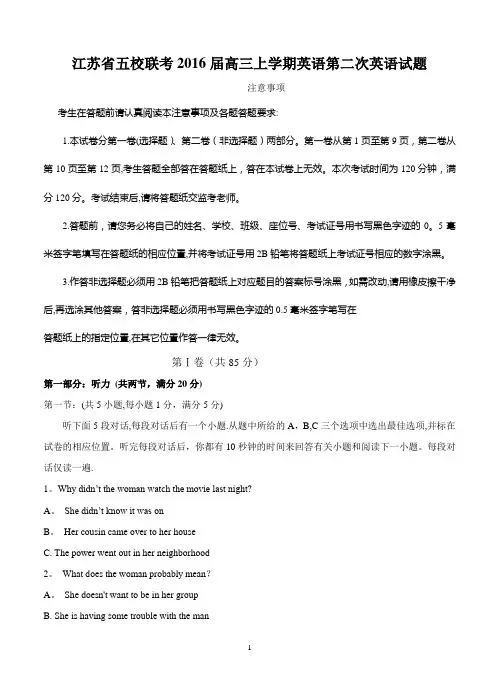
江苏省五校联考2016届高三上学期英语第二次英语试题注意事项考生在答题前请认真阅读本注意事项及各题答题要求:1.本试卷分第一卷(选择题)、第二卷(非选择题)两部分。
第一卷从第1页至第9页,第二卷从第10页至第12页,考生答题全部答在答题纸上,答在本试卷上无效。
本次考试时间为120分钟,满分120分。
考试结束后,请将答题纸交监考老师。
2.答题前,请您务必将自己的姓名、学校、班级、座位号、考试证号用书写黑色字迹的0。
5毫米签字笔填写在答题纸的相应位置,并将考试证号用2B铅笔将答题纸上考试证号相应的数字涂黑。
3.作答非选择题必须用2B铅笔把答题纸上对应题目的答案标号涂黑,如需改动,请用橡皮擦干净后,再选涂其他答案,答非选择题必须用书写黑色字迹的0.5毫米签字笔写在答题纸上的指定位置,在其它位置作答一律无效。
第Ⅰ卷(共85分)第一部分:听力(共两节,满分20分)第一节:(共5小题,每小题1分,满分5分)听下面5段对话,每段对话后有一个小题.从题中所给的A,B,C三个选项中选出最佳选项,并标在试卷的相应位置。
听完每段对话后,你都有10秒钟的时间来回答有关小题和阅读下一小题。
每段对话仅读一遍.1。
Why didn’t the woman watch the movie last night?A。
She didn’t know it was onB。
Her cousin came over to her houseC. The power went out in her neighborhood2。
What does the woman probably mean?A。
She doesn't want to be in her groupB. She is having some trouble with the manC. There are too many projects with the man3。
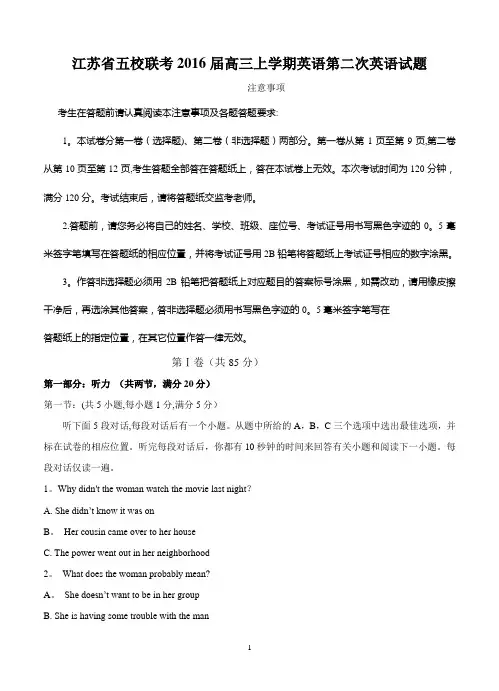
江苏省五校联考2016届高三上学期英语第二次英语试题注意事项考生在答题前请认真阅读本注意事项及各题答题要求:1。
本试卷分第一卷(选择题)、第二卷(非选择题)两部分。
第一卷从第1页至第9页,第二卷从第10页至第12页,考生答题全部答在答题纸上,答在本试卷上无效。
本次考试时间为120分钟,满分120分。
考试结束后,请将答题纸交监考老师。
2.答题前,请您务必将自己的姓名、学校、班级、座位号、考试证号用书写黑色字迹的0。
5毫米签字笔填写在答题纸的相应位置,并将考试证号用2B铅笔将答题纸上考试证号相应的数字涂黑。
3。
作答非选择题必须用2B铅笔把答题纸上对应题目的答案标号涂黑,如需改动,请用橡皮擦干净后,再选涂其他答案,答非选择题必须用书写黑色字迹的0。
5毫米签字笔写在答题纸上的指定位置,在其它位置作答一律无效。
第Ⅰ卷(共85分)第一部分:听力(共两节,满分20分)第一节:(共5小题,每小题1分,满分5分)听下面5段对话,每段对话后有一个小题。
从题中所给的A,B,C三个选项中选出最佳选项,并标在试卷的相应位置。
听完每段对话后,你都有10秒钟的时间来回答有关小题和阅读下一小题。
每段对话仅读一遍。
1。
Why didn't the woman watch the movie last night?A. She didn’t know it was onB。
Her cousin came over to her houseC. The power went out in her neighborhood2。
What does the woman probably mean?A。
She doesn’t wan t to be in her groupB. She is having some trouble with the manC。
There are too many projects with the man3。
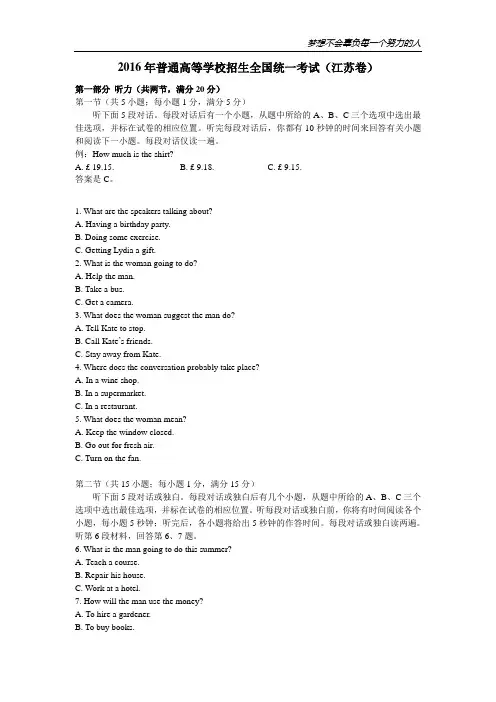
2016年普通高等学校招生全国统一考试(江苏卷)第一部分听力(共两节,满分20分)第一节(共5小题;每小题1分,满分5分)听下面5段对话。
每段对话后有一个小题,从题中所给的A、B、C三个选项中选出最佳选项,并标在试卷的相应位置。
听完每段对话后,你都有10秒钟的时间来回答有关小题和阅读下一小题。
每段对话仅读一遍。
例:How much is the shirt?A. £ 19.15.B. £ 9.18.C. £ 9.15.答案是C。
1. What are the speakers talking about?A. Having a birthday party.B. Doing some exercise.C. Getting Lydia a gift.2. What is the woman going to do?A. Help the man.B. Take a bus.C. Get a camera.3. What does the woman suggest the man do?A. Tell Kate to stop.B. Call Kate’s friends.C. Stay away from Kate.4. Where does the conversation probably take place?A. In a wine shop.B. In a supermarket.C. In a restaurant.5. What does the woman mean?A. Keep the window closed.B. Go out for fresh air.C. Turn on the fan.第二节(共15小题;每小题1分,满分15分)听下面5段对话或独白。
每段对话或独白后有几个小题,从题中所给的A、B、C三个选项中选出最佳选项,并标在试卷的相应位置。
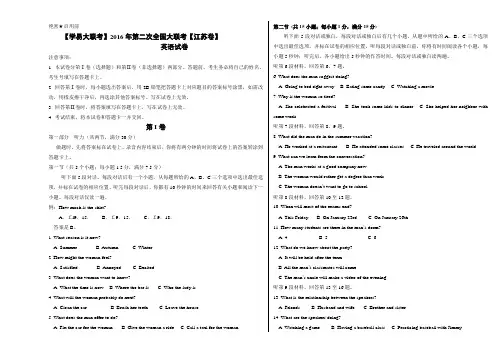
绝密★启用前【学易大联考】2016年第二次全国大联考【江苏卷】英语试卷注意事项:1. 本试卷分第Ⅰ卷(选择题)和第Ⅱ卷(非选择题)两部分。
答题前,考生务必将自己的姓名、考生号填写在答题卡上。
2. 回答第Ⅰ卷时,每小题选出答案后,用2B铅笔把答题卡上对应题目的答案标号涂黑,如需改动,用橡皮擦干净后,再选涂其他答案标号。
写在试卷上无效。
3. 回答第Ⅱ卷时,将答案填写在答题卡上,写在试卷上无效。
4. 考试结束,将本试卷和答题卡一并交回。
第I卷第一部分听力(共两节,满分30分)做题时,先将答案标在试卷上。
录音内容结束后,你将有两分钟的时间将试卷上的答案转涂到答题卡上。
第一节(共5个小题;每小题1.5分,满分7.5分)听下面5段对话。
每段对话后有一个小题,从每题所给的A、B、C三个选项中选出最佳选项,并标在试卷的相应位置。
听完每段对话后,你都有10秒钟的时间来回答有关小题和阅读下一小题。
每段对话仅读一遍。
例:How much is the shirt?A.£l9.15.B.£9.15.C.£9.18.答案是B。
1. What season is it now?A. Summer.B. Autumn.C. Winter.2. How might the woman feel?A. Satisfied.B. Annoyed.C. Excited.3. What does the woman want to know?A. What the time is now.B. Where the bar is.C. Who the lady is.4. What will the woman probably do next?A. Clean the car.B. Brush her teeth.C. Leave the house.5. What does the man offer to do?A. Fix the car for the woman.B. Give the woman a ride.C. Call a taxi for the woman. 第二节(共15小题;每小题1分,满分15分)听下面5段对话或独白,每段对话或独白后有几个小题,从题中所给的A、B、C三个选项中选出最佳选项,并标在试卷的相应位置。
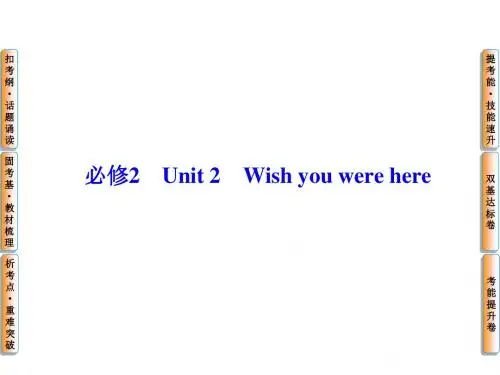
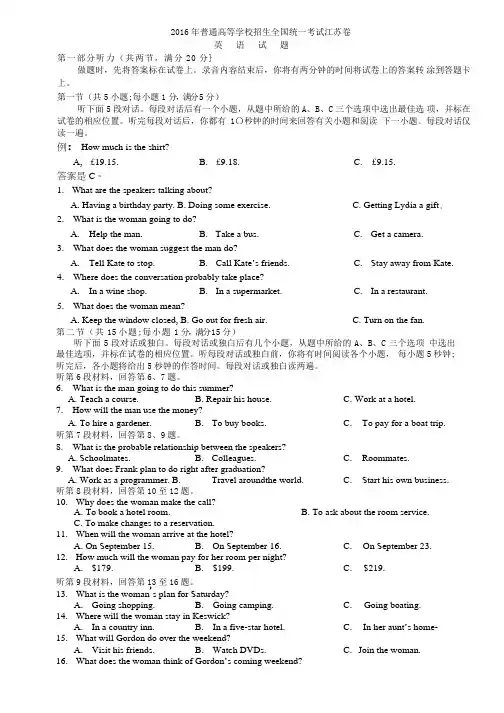
2016年普通高等学校招生全国统一考试江苏卷 英语试题 第一部分听力(共两节,满分20分} 做题时,先将答案标在试卷上。录音内容结束后,你将有两分钟的时间将试卷上的答案转 涂到答题卡上。 第一节(共5小题;每小题1分,满分5分) 听下面5段对话。每段对话后有一个小题,从题中所给的A、B、C三个选项中选出最佳选 项,并标在试卷的相应位置。听完每段对话后,你都有1〇秒钟的时间来回答有关小题和阅读 下一小题。每段对话仅读一遍。 例:How much is the shirt?
A, £19.15. B. £9.18. C. £9.15.
答案是C。 1. What are the speakers talking about?
A. Having a birthday party. B. Doing some exercise. C. Getting Lydia a gift. 2. What is the woman going to do? A. Help the man. B. Take a bus. C. Get a camera. 3. What does the woman suggest the man do? A. Tell Kate to stop. B. Call Kate’s friends. C. Stay away from Kate. 4. Where does the conversation probably take place? A. In a wine shop. B. In a supermarket. C. In a restaurant. 5. What does the woman mean? A. Keep the window closed, B. Go out for fresh air. C. Turn on the fan.
第二节(共15小题;每小题1分,满分15分) 听下面5段对话或独白。每段对话或独白后有几个小题,从题中所给的A、B、C三个选项 中选出最佳选项,并标在试卷的相应位置。听每段对话或独白前,你将有时间阅读各个小题, 每小题5秒钟;听完后,各小题将给出5秒钟的作答时间。每段对话或独白读两遍。 听第6段材料,回答第6、7题。 6. What is the man going to do this summer?
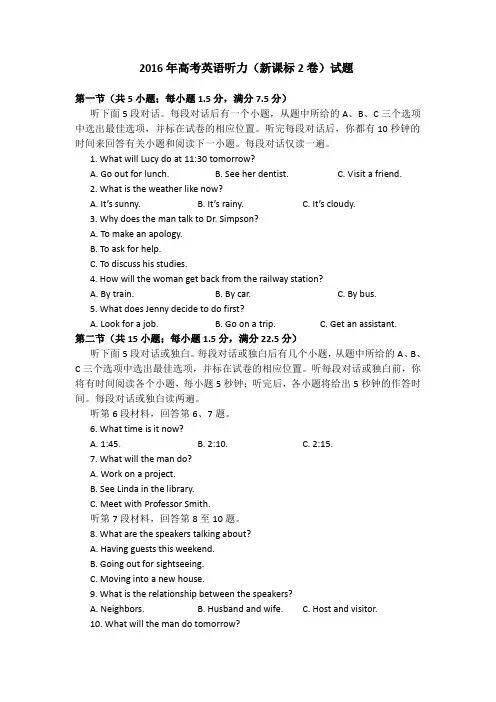
2016年高考英语听力(新课标2卷)试题第一节(共5小题;每小题1.5分,满分7.5分)听下面5段对话。
每段对话后有一个小题,从题中所给的A、B、C三个选项中选出最佳选项,并标在试卷的相应位置。
听完每段对话后,你都有10秒钟的时间来回答有关小题和阅读下一小题。
每段对话仅读一遍。
1. What will Lucy do at 11:30 tomorrow?A. Go out for lunch.B. See her dentist.C. Visit a friend.2. What is the weather like now?A. It’s sunny.B. It’s rainy.C. It’s cloudy.3. Why does the man talk to Dr. Simpson?A. To make an apology.B. To ask for help.C. To discuss his studies.4. How will the woman get back from the railway station?A. By train.B. By car.C. By bus.5. What does Jenny decide to do first?A. Look for a job.B. Go on a trip.C. Get an assistant.第二节(共15小题;每小题1.5分,满分22.5分)听下面5段对话或独白。
每段对话或独白后有几个小题,从题中所给的A、B、C三个选项中选出最佳选项,并标在试卷的相应位置。
听每段对话或独白前,你将有时间阅读各个小题,每小题5秒钟;听完后,各小题将给出5秒钟的作答时间。
每段对话或独白读两遍。
听第6段材料,回答第6、7题。
6. What time is it now?A. 1:45.B. 2:10.C. 2:15.7. What will the man do?A. Work on a project.B. See Linda in the library.C. Meet with Professor Smith.听第7段材料,回答第8至10题。
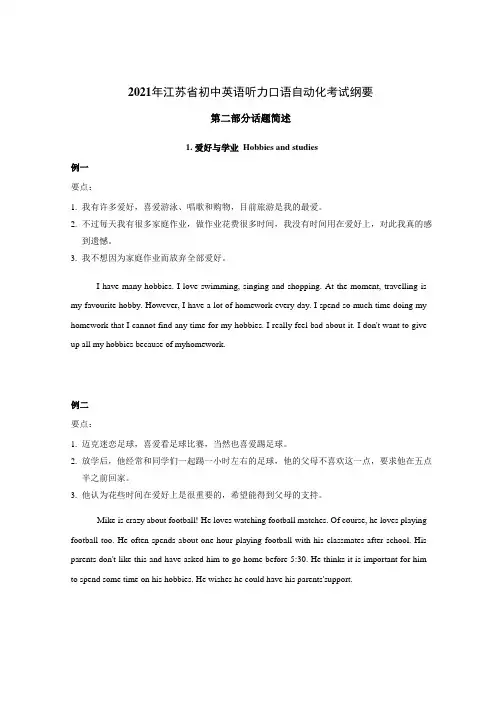
2021年江苏省初中英语听力口语自动化考试纲要第二部分话题简述1. 爱好与学业Hobbies and studies例一要点:1.我有许多爱好,喜爱游泳、唱歌和购物,目前旅游是我的最爱。
2.不过每天我有很多家庭作业,做作业花费很多时间,我没有时间用在爱好上,对此我真的感到遗憾。
3.我不想因为家庭作业而放弃全部爱好。
I have many hobbies. I love swimming, singing and shopping. At the moment, travelling is my favourite hobby. However, I have a lot of homework every day. I spend so much time doing my homework that I cannot find any time for my hobbies. I really feel bad about it. I don't want to give up all my hobbies because of myhomework.例二要点:1.迈克迷恋足球,喜爱看足球比赛,当然也喜爱踢足球。
2.放学后,他经常和同学们一起踢一小时左右的足球,他的父母不喜欢这一点,要求他在五点半之前回家。
3.他认为花些时间在爱好上是很重要的,希望能得到父母的支持。
Mike is crazy about football! He loves watching football matches. Of course, he loves playing football too. He often spends about one hour playing football with his classmates after school. His parents don't like this and have asked him to go home before 5:30. He thinks it is important for him to spend some time on his hobbies. He wishes he could have his parents'support.2. 学校生活School life例一要点:1.杰克是一名八年级学生,就读于伦敦附近的一所学校。
2019年江苏省初中英语听力口语自动化考试纲要说明: 本文中红色的部分表示跟去年相比有改动的。
(本次较往年变化大, 短文变化近一半,话题变化三分之一, 难度增加)第一部分朗读短文1.新增题Today more and more people like to go hiking.Why is hiking becoming so popular?Firstly, hiking is not only a healthy but also a relaxing activity.It’s good exercise that doesn't hurt your body easily.Secondly, it's simple and cheap to go hiking.All you need to do is to wear a pair of hiking boots and a smile on your face.Thirdly, hiking is the best way to get away from your everyday life.You can hike alone or go with your friends.After hiking, you'll have a clear mind and then return to work with confidence.2.新增题DIY stands for "do-it-yourself".When you do DIY, you make, repair or decorate things yourself instead of paying someone to do it.Today, we are going to make some sandwiches.Sandwiches are quick and easy to make.First, you should pick a piece of bread .Then put some tomato sauce on it.Next, you can put some ham and vegetables on it.They are good for our health.Finally, you just need to put another piece ofbread on top of it.If you like, you can cut it in half with a knife.Be careful!I don’t want anyone to get hurt.Why not have a try now?3.去年第1 题Halloween is on October 31.People celebrate it in many ways.Children wear special costumes and masks at Halloween.Many children play a game called “trick or treat”.They knock on their neighbours' doors and shout “trick or treat”.Their neighbours usually give them some candy as a “treat”.If the children do not get any candy, they can play a trick on their neighbours.Some people also make lanterns out of big orange pumpkins.They cut out the eyes, the nose and the sharp teeth.They put candles in them so the light shines through the eyes, the nose and the teeth.4.去年第2 题My ideal school starts at 8 a.m.and finishes at 3 p.m.I love sports and computers, so we have PE and computer lessons every day.The classes are quite small.There are about 20 students in each class.There is a big dining hall.There we can eat and chat with our friends.There is a park on one side of our school and a shopping mall on the other.We have a big library.We also have a tennis court and a swimming pool.There are lots of clubs and after-school activities.Every month, we go on a school trip to amuseum or a theatre.5.去年第3 题My name is Lucy.I am in Year 9 at Woodland School near London.It is a mixed school.Boys and girls have lessons together.My favourite subject is French.Learning foreign languages is fun.Our school has a Reading Week every year.During the week, we can borrow more books from the school library.We can also bring in books and magazines from home.I often read more books than my classmates.Near the end of the week, we discuss the books with our classmates in class.Time seems to go faster when we are reading interesting books.6.新增题Recently we did a survey in our class in order to learn about students’ideal jobs.Here's a report about my group members’ideas.Mary wants to be a teacher when she grows up.She is very patient and enjoys working with children.Now, she is interested in all the subjects and works very hard.Mike would like to be a writer.He is willing to share his wonderful stories with others.Now he keeps reading and writing every day.I want to be dancer because I like dancing very much.I practice dancing every day.Hopefully, everyone can realize their dreams in the future7.去年第4 题Zhalong Nature Reserve is in North-east China.It is one of the world's most important wetlands.The area provides food and cover for a lot of wildlife.It is a perfect place for some rare birds.Some people want to make the wetlands smaller in order to have more space for farms and buildings.This will lead to less and less space for wildlife.Now the Chinese government has made laws to protect Zhalong. Wetlands are important because they provide food and shelter for wildlife including some endangered birds, and they also help prevent floods.We must protect the home of plants, fish and birds in Zhalong.8.去年第8 题We are going to hold a talk on good table manners this afternoon.The purpose is to teach students rules for eating.There will be a lot of advice on table manners.Above all, when you are sitting at the table, you should not start eating until everyone is ready, and it is impolite to make too much noise while you are eating or drinking.You should not eat with your mouth open or talk with food in your mouth.Before you leave the table, wait for everyone to finish. These rules are important because we should make sure that both guests and hosts are comfortable at the table.9.去年第9 题New York, London, Paris and many other cities are exciting places to live.There are lots of interesting things to see and do.But there are serious problems in big cities too.It is expensive to live there, and there are too many people.Every year many people move to the cities to find work, study at good schools and receive high-quality medical care.But sometimes these people can't find work or good places to live.Also it is hard to keep big cities safe and clean.So, before people move to a big city, they should think about the problems they might have to deal with there.10. 去年第13 题Dear Sir,I would like to recommend Daniel for this year's Youth StarAward. Daniel is a clever boy.He learns things quickly.He always thinks carefully when he works.He plans everything well.Daniel is really st week, a five-year-old boy lost his way and was crying in the street.Daniel saw him and took him to the police station.He stayed with the boy and played with him for two hours before the boy's parents came.All the members at the Helping Hands Club think that Daniel should get the award.We look forward to hearing from you soon.YoursSandy11. 去年第12 题Our environment is changing for the worse, so it is time for us to gogreen.Here are some simple steps to take at home.We can save water by taking shorter showers and turning off the tap when we brush our teeth.In order to save power, we should turn off the lights when we leave a room.Some other good habits can help reduce pollution too.We should not use plastic bags when shopping.Recycling is also a good way to help reduce pollution.We should separate waste into different groups so that it can be recycled.Follow these small steps, and you can make a big difference to the Earth!12. 全新题Tan Dun is one of the greatest artists in the world today.When he was very young, Tan showed an interest in music.To him, The best music comes from nature.As he likes the sounds of nature, Tan uses them a lot in his music.For example, in one of his works, Water, he doesn’t use any musical instruments.He makes over 50 sounds from water by controlling the speed of water flow.That's really amazing!Tan has successfully brought Chinese and Western music together.He has helped build a bridge between the East and the west.In his words, "My music is to dream without boundaries."13 去年第14 题Hello, everyone!I've got some great news for you today.Our school basketball team is in the final round of the basketball competition! The match will be on Sunday, the 7th of November, at South Hill School.Now, listen carefully to the plan for the day.At 9 a.m., we'll meet at the school gate.We'll arrive at South Hill School at 10 a.m.The match will start at 10.30 a.m.After the match finishes, there will be the presentation of the cup and medals.The bus will leave at 12 noon from South Hill School and bring you back to school.Please come and support our team.14. 去年第15 题This year's Beijing Music Awards will be covered live this Saturday.All the big pop stars will attend.Before the awards start, we will interview some of the most famous stars.Two thousand fans have voted online for their favourite songs, singers and music videos.The results will be announced during the programme and the host will ask questions for the viewers to answer.As you are watching the awards, write down your answers and send text messages to 1396.If you are lucky enough, you could win two free concert tickets.15.去年的第25 题Winter is my favourite season.It is very cold and everyone has to wear thick warm clothes, but I always enjoy the winter here in Harbin.The temperature is usually below zero and it is often snowy.Everything iscovered in deep white snow, and the lakes and rivers are frozen.During this season, you cannot see beautiful flowers or green trees, but the land is quiet and beautiful.My friends and I love playing outside in winter.It is exciting to have big snowball fights.We also make snowmen and use carrots for their noses.They look funny.Winter is great.16. 全新题Hi, everyone.Here we’re in front of the South Gate.Go straight on, you’ll find the Panda House.Pandas like to eat bamboo and lie down all day long.Walk along the road.To the north of the Panda House, you’ll find the lion.Lions are the kings of the animal world.Turn left, you'll find the World of Birds.Birds make beautiful sounds.To the north of the World of Birds is the Monkeys’Forest.Monkeys are clever and funny.Then turn right, and cross the bridge, you'll see the elephants .Their large ears are like open fans.Here you can see all kinds of animals.Have a nice trip.17. 去年第20All around the world, people drink tea.But tea does not mean the same thing to everyone.In different countries people have very different ideas about drinking tea.In China people like to have tea together with their friends.They drink teaat any time of the day.They put only tea leaves in their cups.They prefer tea with nothing in it.Tea is also popular in Japan.People have tea every day.But the way they drink it is different from that in China.In the USA people drink tea at breakfast or after meals.They usually use tea bags to make their tea."18.全新题Many young people are now giving up their spare time to become volunteers.It is a very meaningful activity because volunteering helps and gives support to different groups in society.Young people can choose to volunteer in many different charities and projects.For example, I do voluntary work for two charities: the first one gives help and support to homeless people, and the second one takes care of the disabled people.Another choice is to take part in special projects or events to raise money for charity.Some people take part in charity walks, or they donate money to charities.You can even organize one of these events yourself.19.去年第17 题We need to do something for giant pandas.They're now in danger.For example, giant pandas do not have many babies during their lives, and it's easy for baby pandas to get sick and die when they are very young.Also, giant pandas mainly live on a special kind of bamboo, so the bambooforests are very important to them.However, the bamboo forests are becoming smaller and smaller.As a result, giant pandas may not have a place to live or food to eat.There are now only about 1600 pandas in the wild.We should take action to protect them right away.20.全新题My dream home is at the foot of a hill.It has three floors.There is a football field behind my house and a swimming pool beside it.There is a kitchen and a home cinema on the ground floor.The kitchen is very clean.There is always more than enough food there.The cinema has a large TV.I would like to invite my friends to watch films with me at the weekend.On the first floor.There are six bedrooms.Each room has a new computer and all the beds are comfortable.There are two large rooms on the second floor.My friends and I have parties there.It is great fun!21.去年第18 题Dear Millie,Thank you very much for your letter.I hope I can offer you some useful advice.You said you often stay up late to finish all your homework.Plan your day carefully.Make a list of all the homework you have.Then work out how much time you need to finish it all.This will give you an idea of how much spare time you have.You also said that you do not have enough time for your hobbies.What about choosing your hobby according to the time you have?I hope you think my advice is worth taking.Best wishes,Helen22.去年第19 题I have to choose a new colour for my bedroom.It is a very important decision, because colour can change a person's mood.I like orange, because it's a happy, warm colour.It can make people feel comfortable.My best friend Jack doesn't agree though.He thinks green is better.Jack says that green represents nature and that it can make you feel energetic.I remind Jack that green is also the colour of envy.My mother recommends blue.She thinks blue is a calm and peaceful colour, so it will make me less stressed and help me relax after school.Perhaps she is right.23.去年第21 题Dinosaurs lived on the Earth a long time ago.We now know that the first dinosaurs appeared about 230 million years ago.There were hundreds of different kinds of dinosaurs, but they didn't live at the same time.Some dinosaurs were really small.One of the smallest dinosaurs was about one metre long and weighed about three kilograms.Others were really big.Some very large ones weighed over100,000 kilograms and some were about 40 metres long.Some dinosaurs ate plants and others ate meat, but they didn't eat grass.All dinosaurs had four legs and lived on land.24.去年第22 题I went to Hainan with my parents in February.Hainan lies in the south of China.Haikou is the capital city of Hainan Province.There are many famous attractions in it.We went to the Holiday Beach, a fantastic place.It was a sunny day, so we took a walk along the beach.We also went to People’s Park.We hired a bicycle and rode around the park.It was much fun! Then we went to Sanya.We went to see some underground caves.I took many photos of them.There is so much to see in Hainan.I want to visit it again in the future25.去年第26 题Yao Ming was born in Shanghai in 1980.He got his first basketball when he was only four years old, but he did not become serious about basketball until he was 12.Yao joined the Houston Rockets in 2002 and became the best Chinese player to ever play in the NBA.When Yao Ming lived in the USA, he returned to China whenever he was needed.He took part in the Olympics in 2004 and in 2008 as one of the Chinese athletes.Since he ended his basketball career, Yao has done a lot of charity work, especially for poor Chinese teenagers.26.去年第27 题UNICEF was set up in 1946 to help children after the war in Europe.Now, UNICEF helps children all over the world.It works in 158 countries.It helps governments and families make the world a better place for children.UNICEF gets its money from donations.It raises money by selling Christmas cards and organizing other fund-raising activities.People can help UNICEF by doing voluntary work.UNICEF believes that all children should have clean water and food so that they can be healthy.It also believes that they should go to school instead of working to support their families.27.全新题Today Daniel and I took an online tour on the website "Around the World in Eight Hours".Sydney is on the south-east coast ofAustralia.It is the largest city In Australia.On the website, we saw lots of pictures of Sydney.Sydney is near the sea.There are many beautiful beaches there.We also saw a wonderful building called the Sydney Opera House.It is a theatre and looks like a ship with many sails.Near the Sydney Opera House is the famous Harbour Bridge.People can climb it.It takes about three hours.It is really cool!28.去年的第28 题My father has worded in a local factory for years.You will not findanything unusual about him until you learn more.My father has always been kind and helpful.He has donated blood many times since 1990.The blood he has donated is enough to save over 70 lives.He has also donated blood cells to people with blood cancer.To my surprise, he has decided to donate his body for medical research after his death.When I was a little girl.I could not understand why my father always seemed to be kinder to others than to his own family.Now I realize that he has a heart full of love.29.全新题Pollution is one of the biggest problems in the world today.In many places, rubbish is thrown into lakes and rivers, so many of them are polluted.In some cities, the air is filled with pollution.Switzerland is still beautiful with high mountains and clean blue lakes.In Switzerland, things like glass, plastic and paper are separated into different groups and then recycled.Even old clothes and shoes can be recycled.The government has many laws to protect the environment.For example, people are not allowed to cut down trees.Otherwise, they be punished.Remember that everyone can do something to make a difference.30.全新题Dear Mum,I am going on a business trip to Shenzhen tomorrow.I have asked my robot to look after you while I am away.You have a serious heart problem and have to take medicine every day.However, you have a poor memory and often forget when you should take your pills.My robot will remind you to take them at the right time.If you want to go out, my robot will help you find your coat.You often feel lonely because you do not know who you can talk to, and my robot will try to do something to make you happy.Take care and I will see you soon!Yours,John第二部分话题简述根据所给的话题和内容要点介绍情况1. 野生动物和宠物Wild Animals&Pets例一要点:1. 我了解到一些动物真的很有趣。
绝密★启用前【学易大联考】2016年第二次全国大联考【江苏卷】英语试卷注意事项:1. 本试卷分第Ⅰ卷(选择题)和第Ⅱ卷(非选择题)两部分。
答题前,考生务必将自己的姓名、考生号填写在答题卡上。
2. 回答第Ⅰ卷时,每小题选出答案后,用2B铅笔把答题卡上对应题目的答案标号涂黑,如需改动,用橡皮擦干净后,再选涂其他答案标号。
写在试卷上无效。
3. 回答第Ⅱ卷时,将答案填写在答题卡上,写在试卷上无效。
4. 考试结束,将本试卷和答题卡一并交回。
第Ⅰ卷第一部分听力(共两节,满分20分)做题时,先将答案标在试卷上。
录音内容结束后,你将有两分钟的时间将试卷上的答案转涂到答题卡上。
第一节(共5小题;每小题1分,满分5分)听下面5段对话。
每段对话后有一个小题,从题中所给的A、B、C三个选项中选出最佳选项,并标在试卷的相应位置。
听完每段对话后,你都有15秒钟的时间来回答有关小题和阅读下一小题。
每段对话仅读一遍。
例:How much is the shirt?A. £19.15.B. £9.18.C. £9.15.答案是C。
1. What season is it now?A. Summer.B. Autumn.C. Winter.2. How might the woman feel?A. Satisfied.B. Annoyed.C. Excited.3. What does the woman want to know?A. What the time is now.B. Where the bar is.C. Who the lady is.4. What will the woman probably do next?A. Clean the car.B. Brush her teeth.C. Leave the house.5. What does the man offer to do?A. Fix the car for the woman.B. Give the woman a ride.C. Call a taxi for the woman.第二节(共15小题;每小题1分,满分15分)听下面5段对话或独白,每段对话或独白后有几个小题,从题中所给的A、B、C三个选项中选出最佳选项,并标在试卷的相应位置。
2015年江苏省初中英语听力口语自动化考试话题简述1.学校生活School life例一要点:Jack is a Year 8 student at a school near London.His favorite subject is Chinese. He thinks learning foreign languages is fun.His school has a reading week every term. Jack and his classmates love it. They can read manybooks and magazines from the school library. Jack loves his school very much.例二要点:Nancy is 14 years old. She’s in the seventh grade.Twice a week, she plays volleyball after school. She loves this game and spends a lot of time practising.Every Monday, Nancy goes to a Buddy Club. There older students talk to new students about schoollife. Her buddy Julie helps her learn all about her new school . Julie is her good friend.2.阅读Reading例一要点:I enjoy reading the books of Robert Louis Stevenson because I find them really exciting.For example, Treasure Island tells the story of a young boy.He sails the sea to look for hidden treasure.His story gives me a lot of confidence.After reading the book, I’m not as shy as I used to be.I also want to travel and have exciting experiences in the future.例二要点:I love reading. I spend over seven hours a week reading different types of books.I am interested in history books, but I like novels best.My friends give me lots of advice on books.We often meet together and discuss what to read.Reading is always a wonderful time.Good books help me relax after a busy day.They also open up a whole new world to me.3.自己动手做Do it yourself例一要点:My cousin Andrew is crazy about DIY. He loves to repair things and decorate his house. But when he finishes, The house always looks terrible.He once tried to put in a brighter light in his bedroom, but he made a mistake. Then his whole house had a power cut.So I bought some books about DIY for him, and I also advised him to take some courses in DIY.例二要点:Here are some tips for making a fruit salad .First, use fruit in season.Then, use fruit of different colours. For example, mixing red apples, green pears and purple grapestogether will make the salad look very colourful .Last,prepare the fruit salad just before you are going to eat it. Some of the fruit will quickly turn brown when you leave it in the air for some time.1.大熊猫Giant pandas例一要点:Everyone likes giant pandas. Giant pandas are quiet and peaceful.They eat a special kind of bamboo .Now, there are only about 1,600 giant pandas in the world. Their number is going down.Their living areas are becoming farmlands.Also, people hunt them for their fur.If this continues, there will soon be no giant pandas in the world .例二要点:The baby panda is called Xi Wang.When she was born, she weighed about 90 grams.She drank her mother’s milk every day.When she was six months old, she started to eat bamboo.Sadly, it is difficult for giant pandas to survive in the wild.If people cut down trees and forests, giant pandas will have nowhere to live.We should try our best to protect them.2.饮食Diet例一要点:I have changed my diet because I want to be healthier.Before, I seldom ate fruit and vegetables. I liked cakes, sweets and cola.Now, I always have a banana, some bread and a glass of milk for breakfast. I usually eat fish andvegetables for lunch.I’m now becoming healthier and healthier. Because of this, my studies have greatly improved.例二要点:Before, Tom loved chips and hamburgers and ate a lot of sweet snacks, but he seldom ate fruit andvegetables.Now, he has changed his diet because he wants to be healthier. For breakfast, he usually has somemilk and bread.He usually has rice, fish and vegetables for dinner. After meals he often eats some fruit.Tom is much healthier now. He knows it is important to change an unhealthy diet.6.爱好与学业Hobbies and studies例一要点:I have many hobbies. I love swimming, singing and shopping. At the moment, travelling is my favouritehobby.However, I have a lot of homework every day. I spend so much time doing my homework that I cannot find any time for my hobbies. I really feel bad about it.I don’t want to give up all my hobbies because of my homework.例二要点:Mike is crazy about football! He loves watching football matches. Of course, he loves playing football too.He often spends about one hour playing football with his classmates after school.His parents don’t like this and have asked him to go home before 5:30. He thinks it is important for him to spend some time on his hobbies. He wishes he could have his parents’support.7.推荐Recommendations例一要点:If you are thinking about visiting Beijing, I recommend this book.It describes many tourist attractions in the city. It also tells you about the local souvenirs. There aremany beautiful photos in the book.You can learn a lot about Beijing from this book.The book is not expensive. You can buy it in a nearby bookshop.I recommend Helen to be the Tennis Club leader.She has been a club member for three years. She always takes an active part in club activities.I often see her practising hard. This year, she came first in the school tennis competition. She is alsovery organized.I think she is a good choice to be the Tennis Club leader.8.变迁Changes例一要点:I know Sunshine Town very well.I moved here with my parents when I was four years old.I have lived here since then.We first lived in the northern party of town.A few years later, we moved to another flat in the centre of town.Now Sunshine Town has changed a lot.It looks like a big beautiful park.例二要点:Sunshine Town has changed a lot.The government has turned the place into a park.We have a large shopping mall and a theatre.We have open spaces and pretty gardens too.However, it is difficult to see some of my old friends.They have moved to Beijing or other places, and I feel a bit lonely from time to time.Sometimes they come back to see me, and that makes me very happy.9.著名人物Famous people例一要点:Tan Dun was born in 1958 in central Hunan, China.When he was very young, Tan showed an interest in music.To him, the best music comes from nature.As he likes the sounds of nature, Tan uses them a lot in his music.Tan has successfully brought Chinese and Western music together.He has helped build a bridge between the East and the West.In his words, “My music is to dream without boundaries.”例二要点:Tan Dun is one of the greatest artists in the world today.He used to make music with common objects like stones and paper when he was young .He loves the sounds of nature. He uses them a lot in his music.For example, in one of his works, water, he doesn’t use any musical instrumentsHe makes over 50 sounds from water by controlling the speed of water flow. That’s really amazing!10. 我的家乡My hometown例一要点:My home town is in the east of China. It is a small town.In it there is a beautiful park. We can go walking there. We can see hills, trees and lakes too.There are some tall buildings in the town and the tallest one has twenty-four floors.There are lots of shops. We often go shopping in them.I like my home town very much.I live near a small city. Outside my house is a bus stop. It takes about ten minutes to get to the citycentre by bus.There are lots of buildings there, including a large shopping mall, a youth centre and a museum. There isa park too.The youth centre is my favourite place. I often go there with my friends at the weekend.11. 颜色Colours例一要点:Some colours make people feel calm and peaceful.Blue is one of these colours. Blue can also represent sadness.Someone who is feeling sad may say, “I’m feeling blue.”Another colour that makes people feel calm and peaceful is white.White is the colour of purity.You could wear white if you are feeling stressed.例二要点:Some colours can make you feel warm.People who live in a cold climate prefer to use warm colours to give their homes a warm and comfortable feeling.Orange is one of the warm colours.Orange can bring you success and cheer you up.Yellow is another warm colour.Yellow is the colour of the sun. It is also the colour of wisdom.12. 介绍Introductions例一要点:Liu Hao is the chief engineer of the high-speed railway connecting Sunshine Town to Tianjin.He is serious and doesn’t like to talk much. He is well organized.He always works to high standards. Liu Hao believes a miss is as good as a mile, so it is necessary topay attention to every detail.He is friendly to his team members. They think he’s modest and easy to work with.例二要点:Sun Ning gave up her job as an accountant 5 years ago.She started to work for the sales department in a big company.In her last job, she could only work with numbers day after day. That made her unhappy. She choseher new job because she loved working with people.Sun Ning is now the general manager of the company. She said she was ready to take on newchallenges anytime.13. 自然灾难Natural disasters例一要点:I was in the library when the earthquake started.The earth started to shake hard .I tried to run outside, but pieces of glass and bricks fell down, and the walls began to come down.Finally, the noise and shaking ended.I realized my leg was trapped. I was afraid that no one would find me. I screamed for help.Luckily, a dog found me and someone pulled me out.例二要点:A snowstorm hit Beijing last Wednesday.After school, Betty shared an umbrella with her friend, Amy, and they walked to the bus stop.The weather was really terrible.Suddenly, a strong wind came from behind.They lost their umbrella in the wind and nearly fell over.They had to walk slowly through the storm to the bus stopAt last, they got on a bus and went home.14. 帮助他人Helping others例一要点:My cousin Judy has taken part in a volunteer project in her college.She works as a primary school teacher in North-west China for one year.She teaches the students Chinese ,English and MathsShe sometimes teaches them songs. She also gives them a lot of books to readJudy thinks it is meaningful for college students to teach children in poor areas.In this way, they can help the local people improve their lives.例二要点:Xiao Wei, a Grade 9 student, has been ill in hospital since last month. The doctor says an operation may save him.But it will cost over 300,000 yuan.Xiao Wei’s parents are both farmers. They do not have enough money. However, it is important for Xiao Wei to have the operation as soon as possible.If all of us can give a helping hand, he may get well again soon.15. 电视TV例一要点:The students in our school like different kinds of TV programmes.Anita is a Grade 7 student. Her favourite programme is Animal World.Her elder brother Tom is in Grade 8. His favourite programme is Sports City.They watch TV for one hour every day. From TV programmes they’ve learned a lot that can’t be learned from books.例二要点:Today is a very exciting day. My cousin and I took part in a TV game show.On the show we had to work together to answer all kinds of questions about sports.Before the show I felt quite nervous, but my cousin and I prepared well.We answered most of the questions correctly.Finally, we got the top score and won the show.My family are all very happy.16. 迪斯尼乐园Disneyland例一要点:My parents and I have been in Hong Kong for three days.We are having a good time here.Today, we spent the whole day at Disneyland.It is a famous theme park. It has four different areas. We visited all of them.At the end of the day, we watched a fireworks show.I took a lot of photos there. I will show them to my friends when I get back.例二要点:Last Saturday we went to Disneyland by underground.First we took photos at the entrance.Then we visited the four areas inside.We were very excited when a parade of Disney characters began later in the afternoon.It was the best part of the day.After the parade, we watched a 4-D film.We stayed at the park for about 8 hours..It was a really exciting day.17. 环境保护Environmental protection例一要点:Pollution is one of the biggest problems in the world today.In many places, rubbish is thrown into lakes and rivers.So many of them are polluted.In some cities, the air is filled with pollution. This makes people ill.As well as people, animals are harmed by pollution.If we do not act to protect the environment, more living things will be killed by pollution.例二要点:Switzerland is beautiful with high mountains and clean blue lakes.In Switzerland, things like glass, plastic and paper are separated into different groups and then recycled.Even old clothes and shoes can be recycled.The government has many laws to protect the environmentFor example, people are not allowed to cut down trees. Otherwise, they will be punished.Remember that everyone can do something to make a difference.18.保护动物Protecting animals例一要点:Zhalong Nature Reserve is one of the world’s most important wetlands. Many birds live there. There are many fish in the wetland, so the birds can easily find food.More and more birds are now in danger because they do not have enough living space. Lots of themhave died.The Chinese government wants to protect these endangered birds. They can be safe in reserves likeZhalong.例二要点:We like birdwatching. We do a bird count twice a year to study the changes in bird numbers.We are now inviting students to help. We need more people to help us count.Many people do not understand the importance of the wetlands. We hope this information will helpthem understand. It may make them take action to protect wildlife.19. 时尚Fashion例一要点:I am a middle school student. Last week I designed a coat, a skirt and a pair of boots.The black coat is made of wool. It is long and beautiful.The red skirt is made of wool too. It is good forautumn. The boots are short and are made of leather. They match the clothes very well.I love them very much.例二要点:Last Saturday, our class held a fashion show. We all wore clothes from different times in the 20thcentury.Helen looked colourful. Her clothes were from the 1980s. John looked very relaxed. He woreblue-and-yellow sports clothes and a pair of colourful trainers. Young people in the 1990s liked wearing trainers.20. 文化Culture例一要点:British people usually say “hello”or “nice to meet you”and shake your hands when they meet you for the first time.They behave politely in public. They think it’s rude to push in before others. They always queue. They are very polite at home as well.“When in Rome, do as the Romans do.”When we are in a strange place, we should do as the localpeople do.例二要点:We can see different public signs in places like hospitals, museums, streets, and parks. They are oftenbright in colour and have pictures on them.Most of them give us useful information.They help us find our way and tell us about the places around us.They keep us safe from danger and warn us not to do sth.For example, we can always see the sign “No photos”in an art museum。
第二部分 话题简述 [1-1] 小变动, 去掉了“来自”,英文没变化。 1.杰克是一名八年级学生,就读于伦敦附近的一所学校; 2.他最喜欢的学科是中文课,他认为学习外语很有趣; 3.学校每学期有一个""读书周"",他和他的同学们喜欢这个""读书周"",他们可以读到学校图书馆的许多书和杂志;他很喜欢他的学校。
Jack is a Year 8 student at a school near London. His favourite subject is Chinese. He thinks learning foreign languages is fun. His school has a Reading Week every term. Jack and his classmates love it. They can read many books and magazines from the school library. Jack loves his school very much.
[1-2](说法小变动,英语不变) 1.南希14岁,是七年级学生; 2.她每周放学后打两次排球;她喜爱这项运动,花很多时间练习; 3.每周一她去""同伴俱乐部"";在那里,老生给新生讲学校生活情况;同伴朱莉帮助她全面了解新学校情况;朱莉是她的好朋友。
Nancy is 14 years old. She's in the seventh grade. Twice a week, she plays volleyball after school. She loves this game and spends a lot of time practising. Every Monday, Nancy goes to a Buddy Club. There, older students talk to new students about school life. Her buddy Julie helps her learn all about her new school. Julie is her good friend. [2-1] 中文小变动,英文不变 去年的第6题 1.我有许多爱好,喜欢游泳、唱歌和购物,目前旅游是我的最爱; 2.但是,每天我有很多家庭作业;做作业花时很多,我没有时间用在爱好上;对此我真的感到遗憾; 3.我不想因为家庭作业而放弃全部爱好。
I have many hobbies. I love swimming, singing and shopping. At the moment, travelling is my favourite hobby. However, I have a lot of homework every day. I spend so much time doing my homework that I cannot find any time for my hobbies. I really feel bad about it. I don't want to give up all my hobbies because of my homework.
[2-2]1.迈克迷恋足球,喜爱看足球比赛,也喜爱踢足球; 2.放学后,他经常和同学们一起踢一小时左右的足球; 3.他的父母不喜欢这一点,要求他在5点半之前回家;他认为有必要花些时间在爱好上,希望能得到父母的支持。
Mike is crazy about football! He loves watching football matches. Of course, he loves playing football too. He often spends about one hour playing football with his classmates after school. His parents don't like this and have asked him to go home before 5: 30. He thinks it is important for him to spend some time on his hobbies. He wishes he could have his parents' support. [3-1] 去年的第5题,内容不变 1.为了更健康,我已改变了饮食; 2.以前,我很少吃水果、蔬菜,喜欢糕点、糖果和可乐; 3.现在,早餐时我总是吃一根香蕉、一些面包,喝一杯牛奶;午餐时,通常吃鱼和蔬菜; 4.我现在越来越健康,学习情况也因此大有改善。
I have changed my diet because I want to be healthier. Before, I seldom ate fruit and vegetables. I liked cakes, sweets and cola. Now, I always have a banana, some bread and a glass of milk for breakfast. I usually eat fish and vegetables for lunch. I'm now becoming healthier and healthier. Because of this, my studies have greatly improved.
[3-2] 1.以前,汤姆喜爱薯条和汉堡包,吃很多甜的零食,很少吃水果和蔬菜; 2.现在,为了更健康,他已改变了饮食;早餐常喝点牛奶,吃点面包;正餐常吃米饭、鱼和蔬菜;饭后常吃些水果; 3.汤姆现在健康多了,他知道改变不健康的饮食很重要。
Before, Tom loved chips and hamburgers and ate a lot of sweet snacks, but he seldom ate fruit and vegetables. Now, he has changed his diet because he wants to be healthier. For breakfast, he usually has some milk and bread. He usually has rice, fish and vegetables for dinner. After meals he often eats some fruit. He knows it's important to change an unhealthy diet. [4-1] 小改动 数量大小写变化,英文不变 1.人人喜欢大熊猫;大熊猫温顺且安静,吃一种特别的竹子; 2.野外现仅有大约1600只大熊猫,它们的数目越来越少; 3.大熊猫生活的地方正在变为农田,而且人们也为取其毛皮而猎捕它们;如此下去,世界上很快将再无大熊猫。
Everyone likes giant pandas. Giant pandas are quiet and peaceful. They eat a special kind of bamboo. Now, there are only about 1,600 giant pandas in the wild. Their number is going down. Their living areas are becoming farmlands. Also people hunt them for their fur. If this continues, there will soon be no giant pandas in the world.
[4-2] 1.熊猫宝宝名叫“希望”,出生时重约90克,每天喝母乳;6个月时,开始吃竹子; 2.可悲的是,大熊猫在野外很难存活;假如人们砍掉树和森林,大熊猫将无栖身之处; 3.我们应当尽力保护它们。
The baby panda is called Xi Wang. When she was born, she weighed about 90 grams. She drank her mother's milk every day. When she was six months old, she started to eat bamboo. Sadly, it is difficult for giant pandas to survive in the wild. If people cut down trees and forests, giant pandas will have nowhere to live. We should try our best to protect them.
[5-1] 去年的第3题 1.我表弟安德鲁对DIY很着迷;他喜欢修理物品,装饰房间;但事后,房间总是一团糟; 2.曾经有一次他想在自己的卧室里安装一盏更亮的灯,但是他犯了一个错误,整个房子都停电了; 3.我给他买了一些DIY书籍,建议他选修一些DIY课程。
My cousin Andrew is crazy about DIY. He loves to repair things and decorate his house. But when he finishes, the house always looks terrible! He once tried to put in a brighter light in his bedroom, but he made a mistake. Then his whole house had a power cut. So I bought some books about DIY for him, and I also advised him to take some courses in DIY.
[5-2] 1.这里有一些制作水果沙拉的小建议; 2.首先,使用当季水果;其次,搭配不同颜色的水果;比如,把红色的苹果、青色的梨子和紫色的葡萄搭配起来会使沙拉看上去五彩缤纷; 3.最后,在食用沙拉前再做沙拉;有些水果在空气中放置一段时间后会很快变色。
Here are some tips for making a fruit salad. First, use fruit in season. Then, use fruit of different colours. For example, mixing red apples, green pears and purple grapes together will make the salad look very